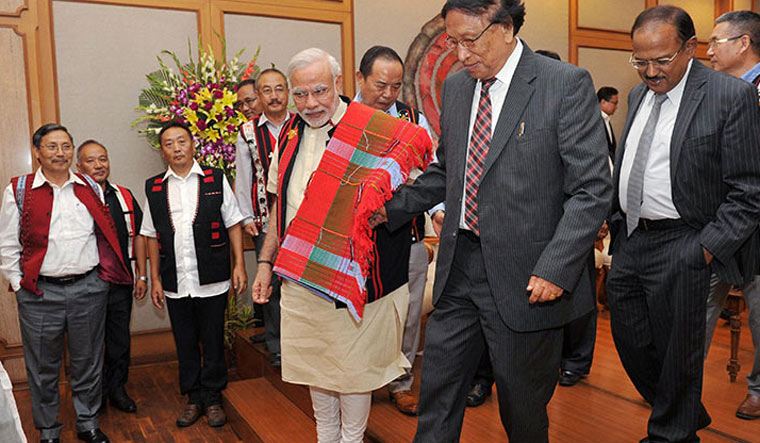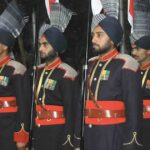
SOURCE: THE WEEK
Naga rebel group NSCN(IM) now wants peace talks with the Centre to be held in foreign countries and that too with Prime Minister Narendra Modi, said a statement issued by the NSCN(IM). A letter in this regard was sent to Prime Minister Narendra Modi by the Ato Kilonser (self-styled prime minister) of the group, T. Muivah, where he requested the prime minister to take a greater initiative to resolve the issue.
Muivah wants the meeting to be held at the prime minister’s level in a foreign country. The demand by NSCN(IM) to have the prime minister attend negotiations outside India is being perceived as outrageous.
When contacted, the NSCN(IM) agreed that their chairman had written to the prime minister.
“But I have nothing to add other than this. Please excuse,” spokesperson of the rebel group, C.T. Son, told THE WEEK.
After the removal of R.N. Ravi, governor of Nagaland, from the post of the interlocutor, the talks have further plunged into crisis as the Intelligence Bureau, which was given the charge to show the path of negotiation, is clueless on how to proceed about it.
The 20-year-long negotiations have seen many rough patches in the past. But these setback were not like the ones being seen now. The Naga situation has been further complicated because of the removal of Article 370 in Jammu and Kashmir, which led Modi government not to show any ground for autonomy in the province.
The NSCN(IM) has mainly three demands: One is territorial unification of Naga-inhabited areas of India and second a special constitution and flag for them (including understanding of the Naga identity).
The third demand—free movement of people in Naga-inhabited areas in India and neighbouring countries—is the most crucial as within it comes an array of issues.
It is not that Union government did not give special autonomy to provincial states earlier, apart from Article 370 given to Jammu and Kashmir. In fact, Mizoram enjoys lot of cultural and social rights. But Nagaland’s core identity is not confined to Nagas based in Nagaland. It is linked to people who are settled in Myanmar as well for which one faction of NSCN(K) is fighting heavily against India across the border. Relaxation would require the ministry of external affairs to sort out issues with the Myanmar government as both sides want to continue living side by side and need easy movement between their borders. MEA would then be required to do away with the visa system for people of certain Myanmar provinces for entry to Nagaland, which the government would find tough to accept.
Leave alone such a complex issue like that, even the unification of Naga areas in states like Manipur, Assam and Arunachal Pradesh is now a distant possibility as those states have decided to oppose the demand.
It is quite unprecedented that the Modi government has decided to find a government authority as negotiator, not an expert who is out of the government. Negotiation with rebels require great deal of flexibility and a senior government official, even if he is powerful like IB chief, could not be flexible. Such an official cannot, in fact, go away an inch from the Constitution to build up consensus with rebels.
The example is Ravi, who once made governor, could not survive the onslaught coming at the negotiation table as he took oath in the name of the Constitution. The success of first negotiator, K. Padmanabhia, retired home secretary, employed by Atal Bihari Vajpayee, and then renowned rebel negotiator Swaraj Kaushal, who brokered the deal in Mizoram in the 1980s, as employed by Rajiv Gandhi, were the examples how apolitical people rose above the political jingoism and accepted flexibility with great deal of reality. It was not that Ravi also did not show maturity and flexibility. But the biggest obstacle for him and the entire negotiation was what happened after he was made governor of a state.
If Modi government had replaced him with a matured diplomat or negotiator, NSCN(IM) would not have perhaps confronted New Delhi and reached the point of almost no return as of today.
For the Central government, it can show flexibility but not a compromise on the lines of political autonomy and integrity of the country. It has finished that possibility with the scrapping of Article 370 in Kashmir.






